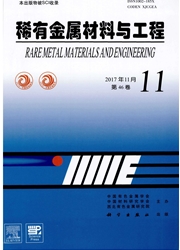

 中文摘要:
中文摘要:
在熔体温度为2323 K,抽拉速率为100μm/s的条件下对Nb-Ti-Si基超高温合金进行了有坩埚整体定向凝固(DS),然后对定向凝固试样进行了2种不同工艺的热处理:即1723 K/50 h高温均匀化处理(HT1)和1623 K/50 h+1723 K/50 h+1373 K/50 h复合热处理(HT2)。采用XRD,SEM和EDS等分析手段研究热处理对定向凝固合金微观组织及其力学性能的影响。结果表明,热处理后合金中大尺寸初生硅化物的体积分数下降,2种方式的热处理均能有效减轻甚至消除合金中的成分偏析。热处理后原DS试样中Nbss+(Nb,X)_5Si_3共晶胞的边界完全消失。相比HT1处理,HT2处理后试样中硅化物的分布更加均匀。与DS试样相比,经HT2处理后试样的室温断裂韧性值增加了12.3%(约19.2 MPa·m(1/2)),且其抗拉伸强度增加了26.6%(最大值达到933.2 MPa)。力学性能的改善主要归因于热处理后组织中(Nb,X)_5Si_3颗粒弥散分布以及韧性Nbss相的形状、尺寸及含量均发生变化。
 英文摘要:
英文摘要:
With the melting temperature of 2323 K and withdrawing rate of 100 μm/s, Nb-Ti-Si based ultrahigh temperature alloy has been directionally solidified with the use of crucibles. The directionally solidified(DS) specimens were subsequently heat-treated in two ways: either at 1723 K/50 h(HT1) or at 1623 K/50 h + 1723 K/50 h + 1373 K/50 h(HT2). XRD, SEM and EDS have been employed to investigate the influence of heat-treatments on the microstructures and fractography of the directionally solidified alloys. The results show that after heat-treatment, the volume fraction of the large-size primary silicides decreases. Both kinds of heat-treatments could effectively alleviate or even eliminate the segregation in the alloys. The original boundaries between the(Nb, X)_5Si_3 + Nbss eutectic cells in the DS specimens have thoroughly disappeared after heat-treatments. Specifically, silicides have been more evenly distributed after HT2 than HT1. Compared with DS specimens, the average room temperature fracture toughness of the specimens has increased by 12.3%(19.2 MPa·m~(1/2)) while the average tensile strength has increased by 26.6% and the maximum value reaches 933.2 MPa after HT2. These improvements could be mainly attributed to the more effective dispersion strengthening of(Nb, X)_5Si_3 silicide particles and the shape change as well as size increase of the ductile Nbss phases after HT2.
 同期刊论文项目
同期刊论文项目
 同项目期刊论文
同项目期刊论文
 Microstructure and microhardness of directionally solidified and heat-treated Nb-Ti-Si based ultrahi
Microstructure and microhardness of directionally solidified and heat-treated Nb-Ti-Si based ultrahi Effect of Al content on the structure and oxidation resistance of Y and Al modified silicide coating
Effect of Al content on the structure and oxidation resistance of Y and Al modified silicide coating Effect of high temperature treatments on microstructure of Nb-Ti-Cr-Si based ultrahigh temperature a
Effect of high temperature treatments on microstructure of Nb-Ti-Cr-Si based ultrahigh temperature a Morphology and phase constituents of mechanically alloyed Nb-Ti-Si based ultrahigh temperature alloy
Morphology and phase constituents of mechanically alloyed Nb-Ti-Si based ultrahigh temperature alloy Microstructure evolution and room temperature fracture toughness of an integrally directionally soli
Microstructure evolution and room temperature fracture toughness of an integrally directionally soli 期刊信息
期刊信息
